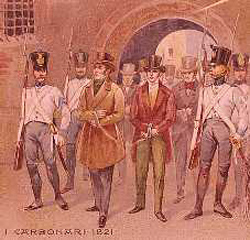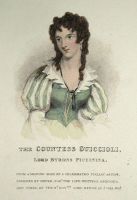January 23, 1821
Fine day. Read - rode - fired pistols, and returned. Dined - read. Went out at eight - made the usual visit. Heard of nothing but war, - 'the cry is still, They come'. The Carbonari seem to have no plan - nothing fixed among themselves, how, when, or what to do. In that case, they will make nothing of this project, so often postponed, and never put in action.
Came home, and gave some necessary orders, in case of circumstances requiring a change of place. I shall act according to what may seem proper, when I hear decidedly what the Barbarians mean to do. At present, they are building a bridge of boats over the Po, which looks very warlike. A few days will probably show. I think of retiring towards Ancona, nearer the northern frontier, that is to say, if Teresa and her father are obliged to retire, which is most likely, as all the family are Liberals. If not, I shall stay. But my movements will depend upon the lady's wishes - for myself, it is much the same.
I am somewhat puzzled what to do with my little daughter, and my effects, which are of some quantity and value, - and neither of them do in the seat of war, where I think of going. But there is an elderly lady who will take charge of her, and T[eresa] says that the Marchese C. will undertake to hold the chattels in safe keeping. Half the city are getting their affairs in marching trim. A pretty Carnival! The blackguards might as well have waited till Lent.
Notes on the text:
Heard of nothing but war - During the first third of the nineteenth century a group of secret societies called the Carbonari were trying to free Italy from foreign intervention and establish constitutional government. The treaty that concluded the Napoleonic Wars gave Austria the right to intervene in Italian affairs in order to maintain the status quo of 1815. At the time Byron wrote, an Austrian army was making its way south to defeat Carbonari insurrections in the area in which he lived.
'the cry is still, They come' This quote from MacBeth, Act V, Scene 5, suggests that -- despite his support for them -- Byron recognizes delusions of power among the Carbonari and overwheming strength of the Austrian forces.
Carbonari - This group of secret societies aimed to establish constitutional government in parts of Italy. It adopted elaborate rituals associated with groups like the Freemasons and was an opponent of the Catholic Church as well as of devine-right monarchy. The Caronari did not achieve their goals and, later in the 19th-century, became absorbed into the movements for national unification. Byron supported the cause and was himself an honorary leader. At the time of this diary entry he was storing arms for them in his house.
the Barbarians - Byron means the Austrian army.
the Po - This river runs eastward across the top of Italy. In the east it separates Venice from Ravenna and the rest of southern Italy.
Ancona - A town south of Ravenna and thus farther away from the advancing Austrian army.
Teresa - This is the Countess Teresa Guiccioli. She was married to the Count when she was only 16 and he was advanced in age. At age nineteen she met Byron and became his lover. The Count at first tolerated the affair, but later obtained sanction from the pope to separate from his wife. She moved in with her father. The Guiccioli's, like much of the Italian aristocracy and middle classes, opposed Austria's intervention and supported the constitutional goals of the Carbonari.
my little daughter - This was Byron's illegitimate daughter,
Clara Allegra Byron, then only four years old. Her mother was Claire Clairmont, the stepsister of Mary Shelley. At this time Byron was her guardian in the sense that, though she did not live with him, he supported her in a place not far away. She would die the next year, not much before he himself died.
Marchese C - This is Marchese Cavalli, brother to Teresa's estranged husband.
This map shows three places mentioned in the diary entry: Ravenna, where Byron lived at the time; Ancona, where he proposed to move in order to avoid the Austrian army; and the River Po which the Austrians are about to cross at the time he writes.
View Larger Map




some sources:
LORD BYRON'S LETTERS AND JOURNALS
Life of Lord Byron, With His Letters And Journals, Vol. 5 / Byron, George Gordon Byron, Baron, 1788-1824
Encyclopedia article on the Carbonari (New Advent Encyclopedia)
Wikipedia article on Allegra Byron
A biography of Allegra
The Byron Chronology - 1820-1821 - Ravenna, Pisa, and Revolutionaries
The Life of Lord Byron 1830 by John Galt (1779-1839)
From Byron Timeline - 1820-1821 - Ravenna, Pisa, and Revolutionaries:
1820
April Byron becomes interested in the actions of the insurrectionist Carbonari who wish for an Italian republic.
Aristocrats like Teresa's father, Count Ruggero Gamba, increasingly oppose the Austrian oligarchy, while the ecclesiastical party actively supports the puppet-government.
May, around the 15th The Count grows angry at Teresa's familiarity with Byron and confronts Byron.
The Count's violent behavior frightens Teresa; the next morning she calls her father and brothers to the Pallazzo and asks to return to their protection
July 6 The Pope grants Teresa a separation.
July Byron, in the summer, visits some of the meetings of the Carbonari and becomes an honorary chief in the Turba (or Mob) faction.




No comments:
Post a Comment